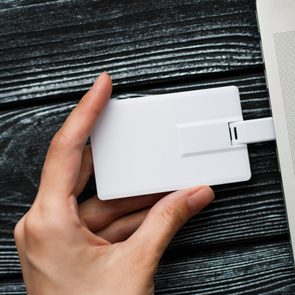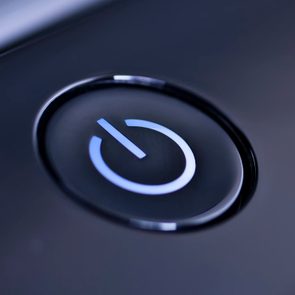Should You Shut Down Your Computer Every Night?
Updated: Jun. 03, 2024

Shutting down your PC at the end of the day has advantages and disadvantages. Here's what every computer owner should know.
If you use your computer daily, you likely either put it into sleep mode or shut it down at the end of the day. Perhaps, like me, you prefer to lazily tap the power button or close your laptop’s lid to put it to sleep after a long work session. Or maybe you’re the energy-conscious type who wants to power down your PC altogether. Whichever is the case, you’ve probably wondered at some point whether you should shut down your computer every night or it it’s OK just to put it to sleep.
There are, in fact, some noteworthy differences between the two. There are also pros and cons to shutting down your computer every night versus putting it into sleep or hibernate mode. Below, we’ll answer the question: Should you shut down your computer every night? We’ll lay out the pros and cons of shutting down your PC and putting it into sleep mode and offer some tech tips you can use to keep your computer healthy.
Get Reader’s Digest’s Read Up newsletter for more tech, travel, cleaning, humor and fun facts all week long.
About the experts
|
Should you shut down your computer every night?
Whether you should shut down your computer at night is a matter of preference—you don’t have to shut it down completely every night. This is true whether you’re using a full-sized desktop PC or a laptop computer. However, it’s a good idea to power it off occasionally—we’ll define how often that means below. This is because your computer clears its RAM (which is like your computer’s short-term memory) of running tasks and performs important software updates upon shutdown. That means you shouldn’t always keep it on, even if you use sleep mode when the PC is not in use.
“If you will be using your computer within a reasonable time again and you want to get to it right away, sleep mode is good,” says Tolga Kaya, PhD, professor of computer engineering. “If you know you will not be using your computer for a few days, just save your work, shut it down and start fresh.”
That said, there are pros and cons to shutting down your computer at the end of each day. Let’s take a look at some reasons why you may want to use sleep vs. shutdown when you’re finished using your PC.
Reasons to shut down your computer
Although you don’t need to shut down your computer every night, there are several good reasons to fully power it off somewhat regularly. Here are some advantages of powering your PC off:
- It can make your computer run better. Shutting down your PC regularly is an easy way to ensure your computer runs faster. A shutdown stops all active software processes and clears your computer’s memory. Furthermore, when you power your computer back on, your PC’s boot-up process includes diagnostic self-tests that make sure everything is running smoothly. This can alert you to any computer problems that could affect performance.
- It may solve a problem your PC is having. We’ve all been there: The computer is acting sluggish or weird, an error message keeps popping up or there’s another annoying issue. We shut down the computer, only to notice (happily) that the problem is gone once our PC reboots. Often, a minor bug or software glitch will clear up during the shutdown and reboot processes. It’s also important to know the difference between shutting down and restarting your computer.
- It can reduce wear and tear on your PC. When your computer is on, the components (primarily the central processing unit or CPU) generate heat. This heat causes gradual degradation of PC parts, which is why most computers have fans to keep things running at safe temperatures. Shutting down your computer lets all the interior components cool. Leaving your computer on all the time may shorten its lifespan.
- It’s more secure. Kaya cites online security as one reason to consider shutting down your computer every night. “When your computer is in sleep mode, your encryption keys (passwords, usernames, etc.) are saved in the memory, which are hackable.” While modern computers typically have anti-malware measures to protect against this, a powered-off computer will always be safer from online hackers than a PC in sleep mode. This is primarily a concern for computers connected to an unsecured wireless network, which includes many public Wi-Fi networks.
- It saves energy. Sleep and hibernate modes are low-power states, meaning your computer still uses electricity when in these modes. However, when you shut it down, the computer and its components don’t draw electricity from the power outlet. This naturally conserves energy, although not enough that you’ll likely notice it on your electricity bill. If you’re using a laptop, shutting it down also preserves the laptop’s battery life if it’s not plugged into a power source.

Reasons to leave on your computer
While shutting down your computer every night has advantages, there are also some drawbacks. “When you shut down your computer, it takes time for it to wake up,” Kaya notes. It’s easy to see why many users prefer not to shut down their computers daily. Here are several reasons why it’s okay to put your computer into sleep mode instead of shutting it down:
- It’s more convenient. Arguably, the best reason to use sleep instead of shutting down your computer is simple convenience. If you use sleep mode, this is probably why. Kaya explains, “In sleep mode, your computer will keep its current state, so you log in and all your work is right there; documents you were working on, web browser, a paused Netflix movie, an email draft, everything. You get right to it within seconds.”
- It keeps background services running. Most computers can still run background tasks while in sleep mode. These background services include software updates, data backups and virus scans. Putting your PC into sleep mode can allow these automated tasks to do their thing at night, making them less likely to interrupt you during the day. Nonetheless, many larger tasks, such as updating your computer’s operating system, cannot happen in sleep mode.
- It allows remote access. Although having your computer on can leave it vulnerable to hackers (even in sleep mode), it can also allow you to access it remotely, even while in sleep mode. Although it’s mostly for technically inclined users, remote access can be useful for things like professional repair or running a web server from afar. Just know that remotely accessing a sleeping computer will wake it up!
- Sleep mode is energy-efficient. Although shutting down your computer saves energy, the benefit is minimal. Kaya told us that sleep modes have become very efficient in recent years, noting, “Energy consumption is not a big issue. It would cost approximately one cent if you left your computer on sleep mode overnight; at least 10 times less than forgetting the kitchen lights on!”
How often should you shut down your PC?
You now know that it’s not necessary to shut down your computer every night. However, occasional shutdowns are beneficial, even if you use your desktop PC or laptop daily. As mentioned above, shutting down your computer clears its memory, ends all running tasks and gives everything a “fresh start” once you power it back on. Important software updates (especially operating system updates) may also happen at this time. This can make your PC run more smoothly over the long term.
But how often, exactly, should you shut down your PC? Your usage habits will likely determine this. “Users should shut down or restart their computers two to three times per week,” advises computer engineer Scott Sobol. He echoes Kaya’s advice, saying, “Shutting down is a better option if the computer won’t be used again for an extended period of time. Restarting is a better option when they plan to use the computer again relatively soon.”
On the other hand, if you use your computer daily, consider shutting it down once or twice a week. For example, if you see a message that it’s time for an operating system update, that’s a great opportunity to install it and then shut the computer down. Alternatively, if it’s been a few days since you’ve shut your computer down and it seems to be running a bit slow, shut it down for the night. Clearing the memory with a shutdown may help your PC run normally the next day.
Shutdown vs. sleep vs. hibernate: Which is better?

Your computer has two different low-power states: sleep and hibernate. “Sleep mode allows a computer to save its current state by recording it to a memory, which helps loading everything you were working on accessible within seconds,” says Kaya. “You can also put your computer into a deeper sleep mode (a.k.a hibernation) where the data is saved on the disk space.”
Because the data is saved on the disk space and not held in the computer’s quick-access memory, it simply takes longer to load. It may even take as long to wake up from hibernation as it does to power on from a shutdown. If you don’t need to shut down your PC and want to put it into a low-power state for convenience, sleep mode is better than hibernation.
Nevertheless, one advantage of hibernation is that your work won’t be lost if the computer loses power since your work session is saved to your hard drive. Remember that your computer memory is erased in the event of a shutdown. It also uses less energy than sleep mode, which is ideal for laptops running on battery power. Sobol notes, “Hibernate is useful when you need to conserve battery power on laptops or maintain your work session across an extended period of downtime without keeping the computer powered on.”
If convenience is not a factor and you haven’t shut down your computer in a few days, a full shutdown might be a better option. Kaya advises shutting down if you don’t need to access your PC the next day. “If you are leaving for vacation or not planning on using your computer for a few days, shutting down would make more sense.”
FAQs
Is it OK to leave your computer on 24/7?
Although you don’t need to shut down your computer every night, it’s not a good idea to leave it on all the time. This can waste energy, cause wear and tear on your computer’s hardware and prevent your PC from completing maintenance tasks such as software updates.
Is it bad to turn off your PC with the power button?
Most computers made within the last decade are safe to turn off with a press of the power button. You can also configure the power button to do something else, like put your computer into sleep mode in your PC’s power settings (this varies by operating system). Note that pressing and holding the power button will usually force the computer to shut down abruptly. Turning your PC off with a forced shutdown can lead to data loss, corrupted software or other issues. You should only use this as a last resort, such as when your computer is frozen and you’re unable to shut it down normally.
Should you turn off your PC at the wall as well?
As long as you are using your computer’s built-in shutdown process, there is no need to disconnect your PC from the wall outlet. However, it’s a good idea to purchase a surge protector and plug your computer into it rather than connecting it directly to the AC outlet. This can protect your computer’s hardware during an electrical surge or sudden power outage. If you are leaving home for a while and want to turn off your PC at the wall, there’s no harm in doing so (just make sure it’s completely shut down first).
Why trust us
Reader’s Digest has published hundreds of articles on personal technology, arming readers with the knowledge to protect themselves against cybersecurity threats and internet scams as well as revealing the best tips, tricks and shortcuts for computers, cellphones, apps, texting, social media and more. For this piece, Lucas Coll tapped his experience as a computer and consumer technology journalist and then Marc Saltzman, a technology journalist with more than 30 years experience and host of the Tech It Out podcast, gave it a rigorous review to ensure that all information is accurate and offers the best possible advice to readers. We rely on credentialed experts with personal experience and know-how as well as primary sources, including tech companies, professional organizations and academic institutions. We verify all facts and data and revisit them over time to ensure they remain accurate and up to date. Read more about our team, our contributors and our editorial policies.
Sources:
- Tolga Kaya, Ph.D, Professor and Director of Engineering at Sacred Heart University; email interview, May 17, 2024
- Scott Sobol, senior IT engineer at Computuners; email interview, May 15, 2024
- Hampshire College, “Shutdown or Sleep?
- Panda Security, “Should You Shut Down Your Computer Every Night? 8 Considerations”
























